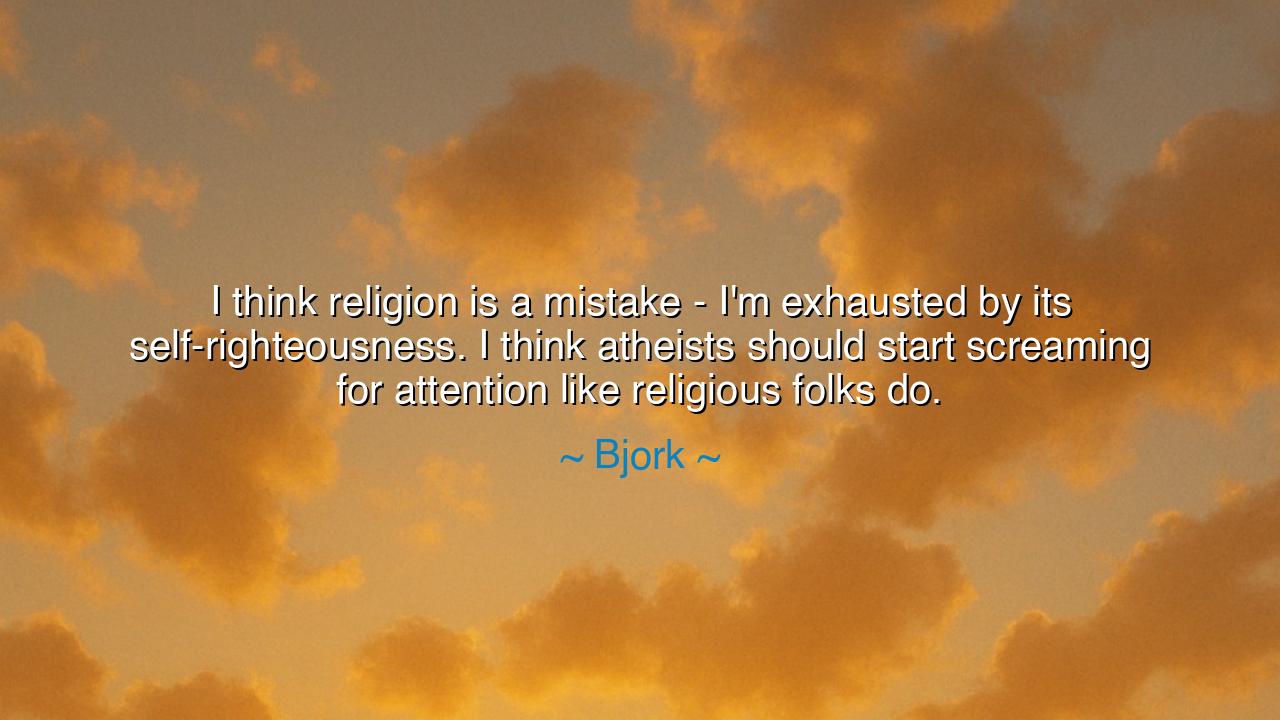
I think religion is a mistake - I'm exhausted by its
I think religion is a mistake - I'm exhausted by its self-righteousness. I think atheists should start screaming for attention like religious folks do.






“I think religion is a mistake – I’m exhausted by its self-righteousness. I think atheists should start screaming for attention like religious folks do.” Thus spoke Björk, the Icelandic artist and visionary whose words, like her music, carry both rebellion and revelation. In this bold declaration, she gives voice to a sentiment as ancient as faith itself — the cry of the soul weary of dogma, weary of the noise of those who claim to own truth. Yet beneath her defiance lies not hatred of the sacred, but a longing for honesty, for a world where belief and disbelief alike are free from hypocrisy, and where the divine, if it exists, may be met with awe rather than arrogance.
Björk, born amidst the raw landscapes of Iceland — a place where volcanoes sleep beneath snow and the heavens touch the earth — is no stranger to wonder. Her music, steeped in nature and emotion, reveals a soul that seeks connection beyond creed. When she speaks of religion as a mistake, she does not scorn the search for meaning; rather, she challenges the corruption of that search. For through the ages, men have taken what was pure — the yearning for the infinite — and wrapped it in institutions that divide rather than unite. What was once a whisper between soul and cosmos has too often become a shout of superiority. It is this self-righteousness — this certainty that “we alone are right” — that exhausts her spirit, and the spirits of many who still yearn for truth but not tyranny.
In her words we hear an echo of the philosopher Voltaire, who centuries ago cried out against the same arrogance. He, too, was weary of religious pride and the wars it had birthed — wars fought in the name of peace, persecutions done in the name of love. “Every man guilty of good sense,” he said, “ought to be of no religion.” Like Björk, Voltaire was not without reverence; he simply refused to bow before men who claimed to speak for God while silencing others. He, too, desired a world where freedom of thought was sacred — where men might search for meaning without fear or conformity.
Yet Björk’s challenge does not end with religion; it turns also to the atheists, those who reject belief altogether. To them she says, “You too must raise your voice.” For too long, she laments, disbelief has been silent, its adherents mocked or dismissed as soulless. She calls for balance — for those who do not believe to speak with the same conviction as those who do. In her vision, truth cannot flourish if only one side of the human spirit dares to speak. Whether one finds meaning in heaven or in humanity, the courage to express it is the lifeblood of culture. Her cry is not for chaos, but for equality — for a dialogue where every voice, sacred or secular, may be heard.
Indeed, history has often turned upon this tension between faith and doubt. Consider Galileo Galilei, who, in gazing through his telescope, saw truths that the Church forbade. He was no enemy of God — he merely refused to let authority silence discovery. Yet for his courage, he was condemned. Here lies the heart of Björk’s grievance: the weariness with those who, certain of their righteousness, smother questioning hearts beneath their certitude. She speaks for all who have been told that doubt is sin, when in truth, doubt is the beginning of wisdom. The flame of progress, whether in art or science, has always been kindled by those who dared to ask forbidden questions.
And so, her words — though modern and fierce — belong to an ancient lineage of prophets and poets who sought to free the human soul from the tyranny of belief without thought. Björk’s rebellion is not the cold defiance of the cynic, but the burning independence of one who demands sincerity. She reminds us that true spirituality — whether it arises in a temple or a field of stars — is born not of fear, but of wonder. Faith that silences others is not faith at all; it is vanity disguised as virtue. And atheism that despises all faith becomes its own religion of pride. Both must yield to humility — to the understanding that truth, vast and mysterious, belongs to none and speaks to all.
Therefore, my child, take this lesson: question boldly, but love deeply. Seek not to dominate with your beliefs, nor to destroy those of others. Whether you worship in silence or speak the name of no god, let your reverence be for life itself — for the mystery that breathes through every being. Be wary of those who claim perfection, for even holiness can be corrupted by pride. Remember that wisdom is not found in shouting louder, but in listening more bravely. And if you must raise your voice, do so not to conquer, but to awaken — to remind the world that thought, faith, and freedom belong equally to every soul.
For in the end, Björk’s words are not a rejection of spirit, but a plea for authenticity. She calls us to cleanse both faith and doubt of their arrogance, to rediscover the sacred in honesty itself. Religion, she warns, must return to humility; atheism must rise from silence. Between the two, the heart of humanity may finally learn to speak — not in the language of conquest, but in the quiet, courageous song of truth.






AAdministratorAdministrator
Welcome, honored guests. Please leave a comment, we will respond soon